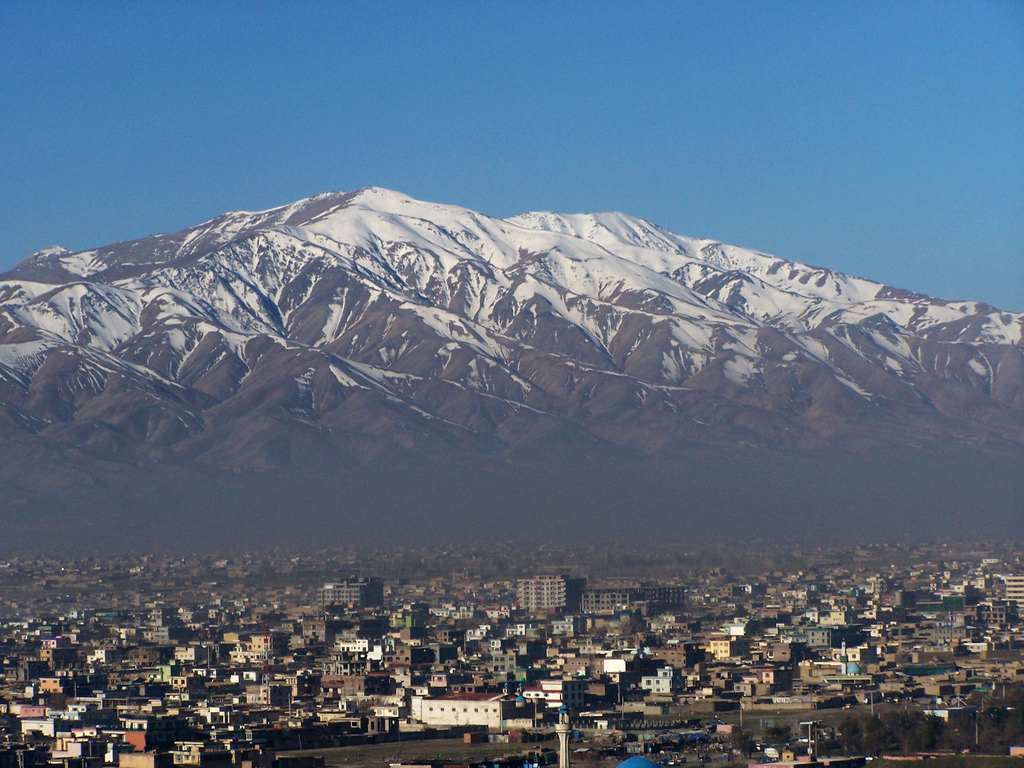Fahim Fazli is a man of two worlds: Afghanistan, the country of his birth, and America, the nation he adopted and learned to love. He’s also a man who escaped oppression, found his dream profession, and then paid it all forward by returning to Afghanistan as an interpreter with the U.S. Marines. When Fahim speaks, the story he tells is harrowing, fascinating, and inspiring. Born and raised in Kabul, Fahim saw his country and family torn apart by revolution and civil war. Dodging Afghan authorities and informers with his father and brother, Fahim made his way across the border to Pakistan and then to America. After reuniting with his mother, sisters, and another brother, he moved to California with dreams of an acting career. After 15 turbulent years that included two unsuccessful arranged marriages to Afghan brides, he finally qualified for membership in the Screen Actors Guild—and found true American love. Though Fahim's California life was happy and rewarding, he kept thinking about the battlefields of Afghanistan. Haunted by a desire to serve his adopted country, he became a combat linguist. While other interpreters opted for safe assignments, Fahim chose one of the most dangerous: working with the Leathernecks in embattled Helmand Province, where his outgoing personality and deep cultural understanding made him a favorite of both Marines and local Afghans—and a pariah to the Taliban, who put a price on his head. Fahim Speaks is an inspiring story of perseverance and patriotism—and of the special love that one man developed for his adopted country.
Paperback, 218 pages
Published February 25th 2012 by Warriors Publishing Group
ISBN 0982167075 (ISBN13: 9780982167076)
About the Author
My Thoughts
Afghanistan.Town/Environment:
Before 1980, most Americans knew or cared little about this impoverished, land-locked, Central Asian nation. After the Soviet Union invaded, though, Afghanistan became a flash point-- one that threatened to ignite a Cold War into the flames of a World War.
The author was born in Kabul, Afghanistan, and later moved to the US as a refugee with his family.
 |
| Mountains of Kabul. Photo captured by Joe Burger from Siegburg, Germany |
"The problem in Afghanistan is that everybody there holds a piece of a mirror, and they all look at it and claim that they see the entire truth."-- Mohsen Makhmalbaf, President of Asian Film AcademyThis book briefly covers the life of Fahim Fazli in Afghanistan, but mostly covers his escape from Afghanistan as a refugee, his struggle to achieve success in Hollywood, and his desire to serve both his adopted country and his native land as a linguist with the Marines in Afghanistan.
Born in Afghanistan, Fahim found himself attempting to survive in a country where he risked relocation to Russia for "re-education". At 12 years of age, he was living in a city invaded by Russia. He, his father and his younger brother had not heard from his mother, older brother or sisters for four years, as they had already escaped to the U.S. Fahim's father Jamil made the decision to take his boys to Pakistan, with hopes of later making it to America.
It was a trek fraught with danger, and there were some near misses. Much of their escape was done on foot, guided by a "coyote", a person who guides people out of the country for a fee. In Peshawar, Fahim found himself faced with armed Taliban fighters patrolling the streets with AK-47s. At one point, an elder advised Fahim's father to get his boys off of the street before they wound up in the soldier's camp:
An unfortunate aspect of the fighter culture there involved young boys being exploited sexually. The practice is known as Bacha Bazi, literally "playing with boys". The practice of selling adolescent boys to wealthy or powerful men for entertainment and sex sadly thrives in both Afghanistan and Pakistan. Abdul had told us earlier that Afghan culture precluded visits to military camps by women or prostitutes and so boys filled a sexual void of sorts for the fighters. (page 30)Once in Peshawar, Fahim was eager to get to America.
We'd soon be in America, a legendary place in the minds of Afghans. Stories abounded about the magnificence and wealth of the United States. Some said it was a sinful place, where women shamelessly tempted men. Others claimed that Americans were allies of the Zionists and enemies of Islam. Still others said that the U.S. was a place of tolerance and generosity. (page 56)After finally making it to the U.S., you get to see it through the eyes of this young Afghan refugee, and get a better idea of how Afghans view our country.
Americans tend to appreciate people as individuals. (page 126)
I marveled at how most American tribes got along and wondered if we could similarly bring the Afghans tribes together.
Anyone walking around Los Angeles can see people from a hundred different countries speaking a hundred different languages, and generally getting along. That's unimaginable in most other parts of the world. (page 157)
It shouldn't matter where anyone came from or what religion they followed, because we all descended from Adam and Eve. Didn't Christians, Jews and Muslims all believe in Abraham? I saw how tolerant people were in America, as compared to Afghanistan or Pakistan. If your religious beliefs changed or evolved here no one killed you. (page 66)You feel for the woman who gave birth to Fahim. Born in a male-dominated country, married off at the age of 16, she is described as an intelligent and driven woman who wanted to be a doctor in a country where women are doomed to lives as housewives and maids and never anything more-- without choice. A woman with strong opinions and desires, she was always at odds with Fahim's father, and there was much yelling and fighting in the Fazli household when Fahim was growing up.
However the woman was no saint. Raised in a culture that believes that "Number One Son" is the favorite, and "Number Two Son" is the "Miserable Son", she could be brutal and cruel in her words to her second son Fahim at times. But there was a lot about her to respect, and she was very beloved by her son.
Fahim was raised with a heavy hand, as is common in Afghanistan. I remember author Andrea Busfield once describing in her book Born Under a Million Shadows (which takes place in Afghanistan) that "...in the streets the adults beat boys, the boys beat smaller boys, and everyone beats donkeys and dogs."
As an adult, Fahim has acted with some of the top actors in Hollywood, and has been a cultural adviser on a number of movies. At one point he was working on the set of Charlie Wilson's War, and was explaining to the extras on the set, who were playing refugees at the Parachinar refugee camp, how excited these refugees would have been to have Americans visiting the camp:
"You must understand how passionate the Afghan Mujahadeen were," I explained. "Imagine if some Communist infidels came to your land, to Morocco, and took away your religion. Picture them taking your sons away and sending them to Russia to be indoctrinate. Think of them dropping bombs on villages, and killing women and children. Consider them destroying your farms and killing your livestock. And know how frustrating it is to be unable to respond in kind, until finally some Americans show up to give you food, supplies, and weapons to take out the Soviet planes. Imagine how happy you'd be to meet the people who brought you the tools you need to reclaim your homeland. And how you have to show how happy, how ecstatic you are to actually meet the people who are giving you the gift of hope." (page 21)Fahim brings better understanding to the issue of the Taliban and what it has been like under their regime.
The Afghan refugee enclaves in Pakistan were increasingly dangerous due to a fanatical new group called the Taliban-- a name which translates to students. These Muslim fundamentalists wanted to rule Afghanistan using a corrupted and intolerant version of Islam. They sought to ban music and movies, and ruthlessly imposed their dogma. (page 77)
While the Communist police state had its own network of insidious informers, this new theocracy was even worse. If a man raped a woman, then she was to blame for tempting him, and the Taliban leaders sentenced her to death. The old Kabul sports stadium, once the site of spirited soccer competition, became a killing ground...
...In 1999, a woman named Zarmeena, a mother of seven, was executed at the stadium-- shot by a young Taliban soldier with a Kalashnikov rifle. Supposedly, she'd disrespected her husband. Thousands of people turned out for the spectacle, including women and children. Women wearing blue burquas dragged the body away as people chanted "Allah Akbar" or "God is Great".
This summary justice became routine. The new regime established laws calling for adulterers to be stoned to death and for thieves to suffer amputations. Life in the new Afghanistan wasn't much different from that of ancient Rome, where gladiators brutalized each other and hungry lions devoured hapless Christians-- largely to entertain the masses who filled the Coliseum to take the depraved spectacles. (page 106)
True to their fundamentalist Wahhabi precepts, Bin laden and Al Qaeda turned on the West after America helped them drive the Soviets from Afghanistan. Wahhabism is a puritanical form of Sunni Islam associated with Saudi Arabia that strongly influenced Bin Laden-- who directed its energy against the Soviets. After the Russians left Afghanistan, that energy was redirected against Western interests. American military presence in Saudia Arabia and elsewhere in the religion particularly angered the Wahhabis, who were utterly intolerant of those who didn't follow a rigid interpretation of the Quran. (page 109)My final word: The writing is very simple and straightforward-- not flowery or overly expressive-- but the storytelling is engaging and enlightening, exposing a side of Hollywood with which I was unfamiliar... the "in"-side. Fahim's story offers more clarity on the people of Afghanistan, how the Taliban came to power, and what refugees would go through in order to get their families to safety. Fahim is a strong man of conviction, yet kind and affable, and his warmth comes through in the telling of his story, albeit the writing style can be a little stiff, possibly due to him being assisted by military writer Michael Moffett. However I found the book to be a worthwhile read.
Buy Now:
Amazon
Barnes and Noble
My Rating:
Disclosure:
I received a copy of this book to review through Netgalley, in exchange for my honest opinion. I was not financially compensated in any way, and the opinions expressed are my own and based on my observations while reading this novel.






















2 comments:
THANK YOU FOR YOUR SUPPORT YOUR THE BEST.
FAHIM FAZLI
what a thorough and thoughtful review! very helpful, thank you!
Post a Comment